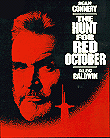 |
C R E A T I N G
The undersea sound effects of
The Hunt for Red October |
|
| Director John McTierman wanted
the sounds of the Hunt of Red October to be credible.
The sound effects produced had to walk
the tightrope between autencity and drama.
In the films underwater arena of nuclear
hide-and-seek, where a ship "sees with its ears" sonar was clearly a priority.
Supervising sound editor Cecelia Hall and
George Watters II made attempt at some sonar pings with sine waves and
reverb unit which McTierman responded "No that's not it!" (They had created
over 500 different pings)
|
| Pings
for the little DSRV |
Deep
Submerge Rescue Vehicle
Various versions
of sonar pings played through a underwater speaker in a swimming pool and
re-recorded at the other end.
|
| Pings for
the big Russians and Americans subs |
A synclavier proved useful for recalling
old EQ settings digitally.
Finally one of the sonar pings was run
through an harmonizer along with many closed spaced delays. Having sampled
that into the synclavier and played it back with an interval under just
a 5th we found the Russian (and later the American) pings.
When they had the exact sonar sounds we
needed, the pings were sequenced to the picture so rate would increase
as torpedoes and other objects got closer.
|
The torpedo sound was a combination of
..
-
speedboat coming and going
-
a Ferrai
-
animal screeches and growls
-
bubbles
-
a motor scooter
-
a screeching screen-door spring
-
sound of water rushing through a garden hose
into a pool.
This sound was processed and used to as an
explosive element for the initial compressed-air release, where it's launched
from the shaft.
|
| Russian
submarine's silent drive |
A combination of..
-
pile driver effect from the sound library
-
discordant tuning fork,
-
the dragging sound of 25-foot steel pipes
which were being used for road construction in front of the sound studio
|
To create an alarming and realistic malfunction
these elements were combined in the final mix...
-
an oil pump
-
weird skids
-
a boat banging and groaning against a dock
McTierman requested that an anvil sound be
inserted in order to create the rhythmic pounding of metal that audiences
would associate with a damaged engine.
|
| "Squeals"
and "groans" for ship-stress sounds |
Recorded sounds from Disneyland's rides
such as "Space mountain"
The metal experience thousands of pounds
of stress from centrifugal force of the cars as they pass sharp turns
|
| Background
submarine presence |
A tanker about five miles in distance recorded
under water (at 150 feet)
|
|
A key propeller element in all ships came
from an empty tanker that was recorded on its way to the harbor with the
prop one-quarter of the water. It had the higher pitch sound of screws
and also a hammering effect.
The low end throb-sound,
with lots of water movement heard in the first bottom view of the Dallas
and in other sub exterior shots was created in a swimming pool.
Cannonballs of the
diving board was captured from various acoustic perspective.
Sound designer
Frank Serafine:
"I
built one mike by taping a pressure zone mike to the inside of a 35 mm
film can. I filled it with 40-weight oil, the sealed it with epoxy and
suspended it in water. The oil-can picked up the low-end sounds which helped
evoke the mass and size of an nuclear submarine".
I slowed the cannonballs
and trigged them rhythmically so that one became a "rev" of the propeller
blades. This "whooshing" sound was combined from recorded tankers." |
|
|
|
Edited excerpts from
Frank Serafine: Creating the Undersea Sounds of Red October
American Cinematographer September 1990 |